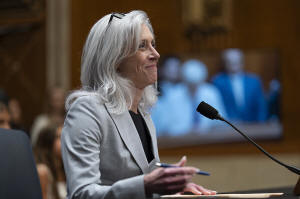CDC nominee Susan Monarez sidesteps questions about disagreements with
RFK in Senate hearing
[June 26, 2025]
By JONEL ALECCIA
Susan Monarez, President Donald Trump's pick to lead the U.S. Centers
for Disease Control and Prevention, told senators Wednesday that she
values vaccines, public health interventions and rigorous scientific
evidence, but largely sidestepped questions about widespread cuts to the
agency, elimination of programs and whether she disagreed with any of
Health Secretary Robert F. Kennedy Jr.'s actions to date.
“The secretary is doing the important work of leading a complex agency,”
Monarez told members of a Senate health committee that will decide
whether to advance her nomination.
Monarez, 50, is the first nominee for CDC director to require Senate
confirmation. She was named acting director in January and the nominee
for the post in March after Trump abruptly withdrew his first choice,
David Weldon. Monarez is the former director of a federal biomedical
research agency and a respected scientist, though she would be the first
nonphysician to lead the CDC in decades.
Monarez repeatedly said she had not been involved in decisions earlier
this year to cut hundreds of staff and eliminate CDC programs, but that
she would work to retain the agency's core functions and transition key
programs to other parts of the Health and Human Services department.
Her answers appeared to frustrate some senators, including Virginia
Democrat Tim Kaine, who said he had no questions about her
qualifications.
“I've got questions about your willingness to follow through on your
values,” he said.

In the two-hour hearing, Monarez was sharply questioned about Kennedy's
recent move to fire all 17 members of a crucial committee that evaluates
and recommends vaccines, his downplaying of the risks of measles during
a nationwide outbreak and staffing cuts to a program that investigates
lead poisoning in children.
Sen. Bill Cassidy, a Louisiana Republican who is chairman of the
committee, sought assurances about the scientific integrity of the CDC’s
Advisory Committee on Immunization Practices, which was reconstituted by
Kennedy to include vaccine skeptics.
“Someone can speak as a critic, but there should be someone who's
reviewing the overwhelming evidence of the safety of vaccines,” Cassidy
said.
[to top of second column]
|

Susan Monarez, President Donald Trump's nominee to be director of
the Centers for Disease Control and Prevention, arrives to testify
before the Senate HELP Committee, at the Capitol in Washington,
Wednesday, June 25, 2025. (AP Photo/J. Scott Applewhite)
 Monarez said she strongly supported
public health interventions, including immunizations, saying, “I
think vaccines save lives."
“The ACIP has a very vital role to play,” she added. “And it must
make sure that it is using science and evidence to drive that
decision-making.”
She vowed to prioritize innovation, “evidence-based rapid
decision-making” and clear communication at the $9.2 billion agency
tasked with evaluating vaccines, monitoring diseases and watching
for threats to Americans' health.
Monarez declined to say whether she had disagreed with any of
Kennedy's decisions regarding the agency to date, saying he has
“laid out a very clear vision.”
“I think he has prioritized key public health activities for
preventing chronic diseases," she added.
If Monarez is confirmed, it would end a stretch of confusion at the
Atlanta-based CDC, where, for months, it wasn’t clear who was
running the agency. The acting director's role was filled in part by
Matthew Buzzelli, the CDC’s chief of staff who is a lawyer and
political appointee with no medical experience.
Monarez holds doctorate in microbiology and immunology from the
University of Wisconsin, and her postdoctoral training was in
microbiology and immunology at Stanford University.
At CDC headquarters in Atlanta, employees have said Monarez was
rarely heard from between late January and late March, when Trump
nominated her.
The CDC was created nearly 80 years ago to prevent the spread of
malaria in the U.S. Its mission was later expanded, and it gradually
became a global leader on infectious and chronic diseases and a
go-to source of health information.
All contents © copyright 2025 Associated Press. All rights reserved |